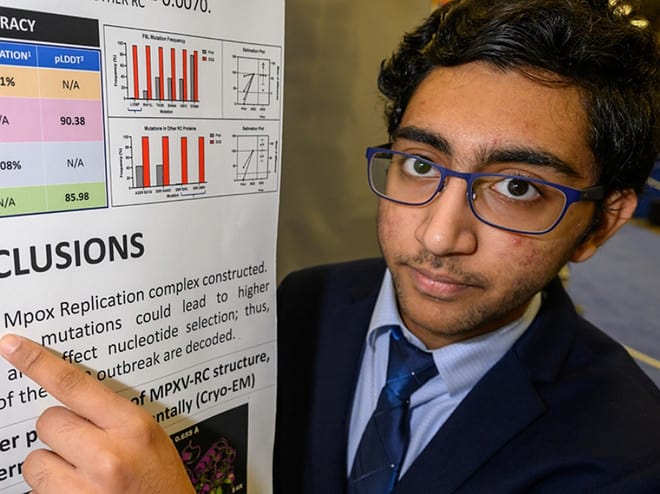(June 16, 2023) In the realm of scientific discovery, there are individuals whose exceptional talent and dedication propel them to new heights of innovation. Such is the case with Indian-American teen Saathvik Kannan, a prodigious young scientist who recently made headlines for winning the prestigious Regeneron Young Scientist Award, accompanied by a remarkable $50,000 prize. Saathvik’s groundbreaking research in biocomputational methods shed light on the heightened infectivity of the mpox (monkeypox) virus, which resurfaced in the world in 2022, presenting a significant public health challenge.
Research on mpox
The re-emergence of the mpox virus in 2022 sent shockwaves throughout the scientific community and global population alike. This highly infectious disease had previously been considered largely eradicated, with only sporadic cases reported in remote regions. However, its resurgence demanded immediate attention and investigation to understand the causes behind its heightened infectivity. It was during this critical juncture that Saathvik, armed with his extraordinary scientific acumen, embarked on a mission to unlock the mysteries surrounding mpox.

Saathvik Kannan
Kanan’s pioneering research was centered on the utilisation of biocomputational methods, which he used to unearth and understand the factors causing such infectious diseases as monkeypox that resurged in 2022 when the COVID-19 pandemic began to recede in most parts of the world. Bioplex, the approach he used, uses machine learning and three-dimensional protein modeling to decode structures enabling the virus to replicate. Showing his gratitude for his mentor, the Global Indian wrote, “I was overjoyed and incredibly excited. I felt that it reflected our work with Dr Singh’s mentorship and guidance over the last few years culminating in my project this year.”
How it began
The Missouri-born and raised Indian American was in eighth standard when he became interested in programming, and soon began learning python and other programming languages. However, it was at the age of 14 that he was propelled into the world of computational biology, after meeting a University of Missouri researcher. It began in the summer of in 2020, during the pandemic, when Saathvik’s father came across a paper published by Kamlendra Singh detailing the use of RNA polymerase inhibitors while creating an initial vaccine. The paper gained attention in the scientific community nationally and internationally.


Saathvik soon reached out to Kamlendra to set up a meeting on Zoom to understand how his abilities could be used in a lab setting. To which Kamlendra replied, “If I could have a computer programmer, I could do better research.” This was Saathvik’s cue and soon they both joined hands, which was the beginning of a new partnership. With Covid-19 at its peak, Saathvik built a program to help analyse mutations in many viral organisms, thus leading to a paper about the D614G mutation within Covid-19.
Research for the future
Alongside the Covid-19 research, he also wrote a paper on the mpox virus after its resurgence in the 2022, which highlights the way new mutations affect the virus. “The research provides a basis for understanding several new outbreaks,” Kannan said, adding, “As we have realized with Covid-19 and even mpox, any virus can go from dormancy to a full resurgence in a very short period. So, there is potential for another outbreak of mpox, where this research could be used.” His research can help better understand viruses like mpox.
Beyond the scientific realm, Saathvik’s achievement serves as a beacon of inspiration for young aspiring scientists worldwide. His unwavering dedication, tireless efforts, and groundbreaking research stand as a testament to the power of passion and perseverance in the pursuit of knowledge.
The Regeneron Young Scientist Award, which recognizes exceptional scientific inquiry and innovation in high school students, is a testament to the impact young minds can have on the world. By honoring Saathvik Kanan’s research on the mpox virus, this award amplifies the urgency of addressing emerging infectious diseases and encourages further exploration into the mechanisms that drive their resurgence.
The senior at Hickman High School Columbia, who likes to strike a good balance between his research and social life, is excited to continue his research even during his college life because learning is his priority.




